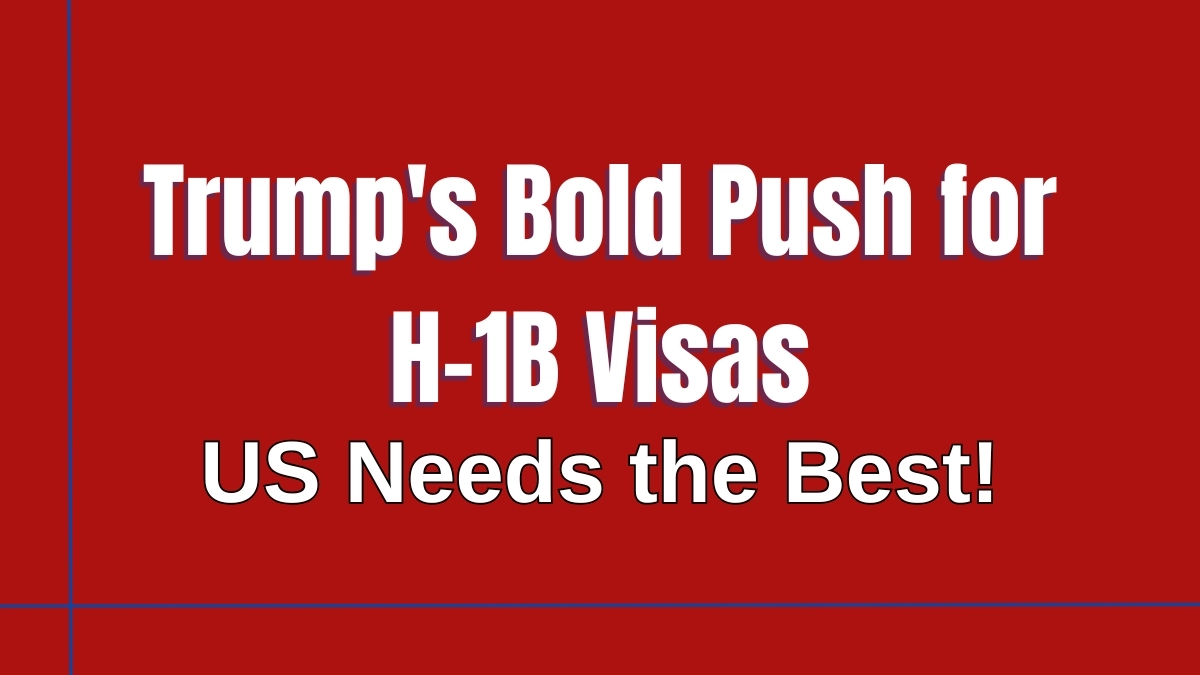In a recent statement that has sparked considerable discussion, former President Donald Trump expressed his unwavering support for the H-1B visa program, asserting that the United States requires “very competent people” to drive its economy forward. This declaration comes at a time when immigration policies are under intense scrutiny, particularly regarding skilled labor from countries like India and China. Trump’s remarks, made during a press conference alongside tech industry leaders, highlight a significant shift in his rhetoric concerning immigration—a topic that has long been contentious within American political discourse.
Trump’s comments resonate deeply with both American and Indian audiences, as many skilled workers from India rely on the H-1B visa to pursue opportunities in the United States. The implications of his stance are vast, impacting not only potential immigrants but also American businesses that depend on this skilled labor force.
Understanding the H-1B Visa Program
What is the H-1B Visa?
The H-1B visa program allows U.S. employers to temporarily employ foreign workers in specialty occupations that require theoretical or technical expertise. This visa is particularly popular among technology companies seeking engineers and IT professionals from countries like India.
Who Benefits from the H-1B Visa?
The program primarily benefits:
- Skilled Workers: Many highly educated individuals from India and China secure positions in sectors such as technology, healthcare, and engineering.
- U.S. Employers: Companies often struggle to find qualified candidates domestically and rely on this program to fill critical roles.
Current Context of the H-1B Visa
Trump’s recent comments come against a backdrop of evolving immigration policies. Under President Biden, there have been efforts to streamline the application process and address misuse of the program. However, Trump’s reaffirmation of support suggests potential changes ahead if he returns to office.
Trump’s Evolving Stance on Immigration
Historical Perspective
During his presidency, Trump was known for his hardline stance on immigration, often criticizing programs like H-1B as detrimental to American workers. His administration implemented stricter regulations that increased denial rates for visa applications.
However, recent statements indicate a nuanced understanding of the program’s importance. Trump stated, “I like both sides of the argument,” suggesting an awareness of the balance between protecting American jobs and fostering economic growth through skilled immigration.
Support from Industry Leaders
Notably, Trump’s support aligns him with influential figures in the tech industry. Billionaire Elon Musk and other business leaders have advocated for expanding the H-1B program to attract talent necessary for innovation and competitiveness in a global market. Musk has argued that the U.S. does not produce enough qualified engineers domestically to meet industry demands.
Implications for Indian Workers
Impact on Indian Professionals
India is one of the largest beneficiaries of the H-1B visa program. Many Indian professionals view this visa as a gateway to better career prospects and life in the U.S. Trump’s comments could reassure these individuals about their prospects should he regain political power.
However, there remains a divide within Trump’s base regarding immigration policies. Some supporters fear that increasing foreign labor could threaten job opportunities for American workers, particularly in technology sectors.
The Future of H-1B Visas Under Trump
Potential Changes Ahead
If Trump returns to office, it remains uncertain how he will reconcile his support for skilled immigration with his base’s concerns about domestic employment. Political analysts suggest that he may attempt to frame his stance as beneficial for economic growth while addressing concerns about job competition.
Advice for Employers
Companies relying on H-1B visas should prepare for potential changes in policy by:
- Reviewing Compliance: Ensuring adherence to current regulations is crucial as scrutiny may increase under a new administration.
- Planning for Delays: Employers should anticipate longer processing times and potential regulatory hurdles.
Conclusion
Donald Trump’s recent endorsement of the H-1B visa program marks a significant moment in U.S. immigration discourse. As discussions around skilled labor continue to evolve, both American businesses and prospective immigrants will be keenly watching how these policies unfold in the coming years.
FAQs
What should companies do if they rely on H-1B visas?
Companies should ensure compliance with current regulations and prepare for potential delays or changes in policy if Trump returns to office.
How has Trump’s stance on H-1B visas changed over time?
Initially critical of the program during his presidency, Trump has recently expressed support, emphasizing the need for competent individuals in various fields.
Who primarily benefits from the H-1B visa program?
Skilled professionals from countries like India and China benefit significantly from this program as it provides them opportunities to work in the U.S.
What is an H-1B visa?
The H-1B visa allows U.S. employers to hire foreign workers in specialty occupations that require specialized knowledge.

